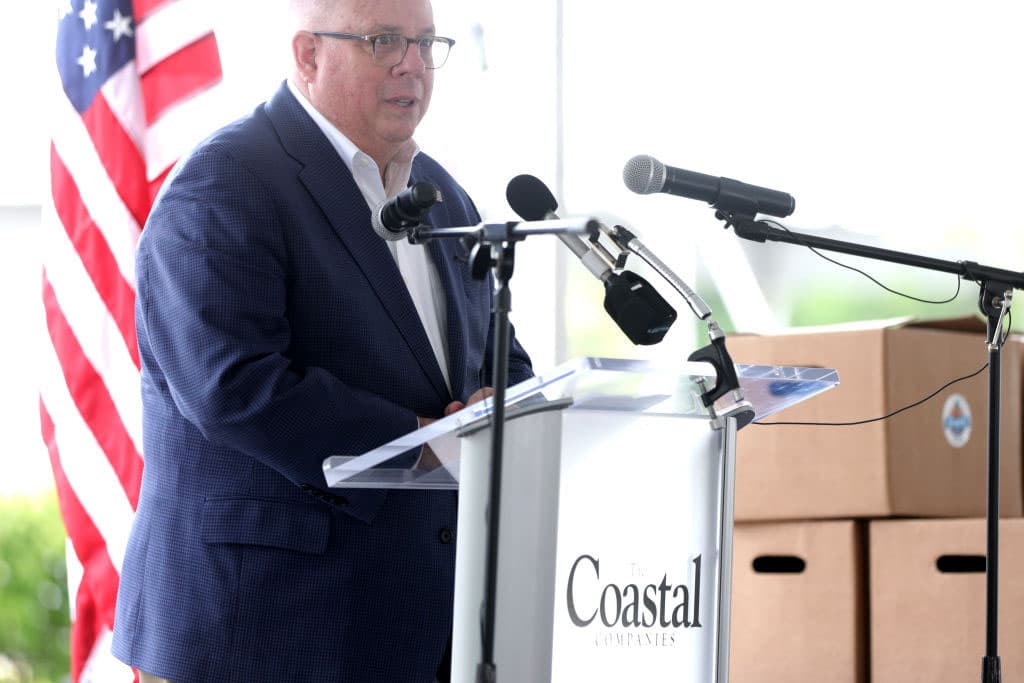 U.S. Sen. Ben Sasse (R-NE) speaks before the Senate Judiciary Committee on the third day of Judge Amy Coney Barrett’s Supreme Court confirmation hearing on Capitol Hill on October 14, 2020 in Washington, DC. (Photo by Ken Cedeno-Pool/Getty Images)
U.S. Sen. Ben Sasse (R-NE) speaks before the Senate Judiciary Committee on the third day of Judge Amy Coney Barrett’s Supreme Court confirmation hearing on Capitol Hill on October 14, 2020 in Washington, DC. (Photo by Ken Cedeno-Pool/Getty Images) For those of you who are more than ready for the 2020 presidential election to be over, I’m afraid I have some unpleasant news. It seems the 2024 campaign is now underway.
Republican Senator Ben Sasse of Nebraska, long-rumored to have his eye on the White House, unofficially kicked off the 2024 GOP primary contest last week on a well-attended telephone town hall event that his staff eagerly promoted for broader media coverage.
On the call, Sasse excoriated Trump. “I’m not at all apologetic for having fought for my values against his in places where I think his are deficient, not just for a Republican, but for an American,” Sasse told his constituents on the call. Sasse then delivered a series of diatribes against Trump that would make Nancy Pelosi or Adam Schiff sing and shout.
Sasse criticized the president for treating the COVID-19 pandemic “like a PR crisis,” and for “the way he kisses dictators’ butts,” “sells out allies,” “mocks evangelicals behind closed doors,” “flirt[s] with White supremacists”—and so on.
Sasse is no progressive. He is not a Susan Collins moderate or part of the party’s Romney-Bush-McCain establishment. He is a committed and passionate conservative from whom most Democrats would flee if he became the Republican nominee four years from now.
Another never-Trump Republican who has inched closer to the 2024 campaign is Maryland Governor Larry Hogan, who announced last week that he would write in Ronald Reagan’s name in this year’s election. Hogan’s symbolic action was not nearly as demonstrative or combative as Sasse’s assault, but it still sent a message to what remains of the GOP’s moderate wing that he is weighing his options.

Whether Trump is re-elected or not, the Republican Party is splitting into two distinct camps of a heated intra-party debate over the current president’s legacy. The pro-Trumpers, including Secretary of State Mike Pompeo, Vice President Mike Pence, Senators Tom Cotton, Rick Scott and Josh Hawley, and very possibly Donald Trump, Jr., will fight to deepen Trump’s imprint on the party. Sasse and Hogan will be part of an even larger group called “post-Trump (or pre-Trump) conservatives.” This group will likely include some of the defeated 2016 contenders, such as Senators Marco Rubio and Ted Cruz and former governor John Kasich. Former United Nations Ambassador Nikki Haley will be able to straddle that divide and opt in either direction.
Trump’s own fate this fall will provide a considerable advantage to one of these two factions. If the president is re-elected, his loyalists will have the benefit of a White House bully pulpit to solidify their support from party activists for the next four years. But if Trump falls short, it becomes much more likely that Republicans will search for a new — or old — direction away from him as they try to re-brand their party.
Trump’s own fate this fall will provide a considerable advantage to one of these two Republican factions.
By the president’s own admission, the latter outcome is becoming more likely (though certainly not definite). In campaign remarks on Friday night in Georgia, Trump wondered out loud what would happen if he is defeated.
“Could you imagine if I lose?” he asked his supporters. “I’m going to say, ‘I lost to the worst candidate in the history of politics.’ I’m not going to feel so good. Maybe I’ll have to leave the country.”
Some of this uncharacteristically self-deprecating language may have been tactical. Trump enjoys being underestimated and understands the motivational benefits of this approach. But his increasingly plaintive appeals to suburban women and senior voters in recent days suggests an awareness that his path to re-election is decidedly uphill.
Other leading Republicans are beginning to sound the alarm about the possibility of a sizable defeat for their faction. Trump stalwart Lindsay Graham told Democratic members of the Senate Judiciary Committee last week that “You all have a good chance of winning the White House.” Other leading GOP operatives have also begun publicly second-guessing Trump’s campaign management team for strategic and spending errors.
But the final outcome is still very much in doubt. In the meantime, though, know that the 2024 election is a mere 1476 days away.
Dan Schnur teaches political communications at UC Berkeley, USC and Pepperdine. He hosts the weekly webinar “Politics in the Time of Coronavirus” for the Los Angeles World Affairs Council & Town Hall.






















 More news and opinions than at a Shabbat dinner, right in your inbox.
More news and opinions than at a Shabbat dinner, right in your inbox.